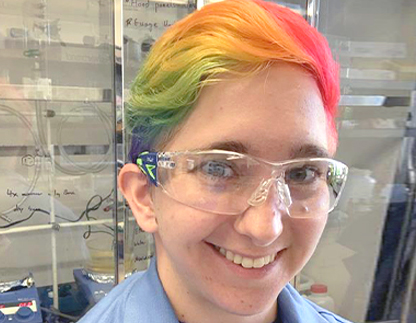The reality that I am one of only a few people in the world working on these kinds of materials is both rewarding and challenging.”
Casandra "Clover" Moisanu
PhD Candidate in the Department of Chemistry

Casandra “Clover” Moisanu is a PhD candidate in the Department of Chemistry in the Weinberg College of Arts and Sciences. In their research, they create complex molecular materials by combining charged molecules using a donut-shaped molecule called calix[4]pyrrole to hold them in place. Clover is a member of the Dichtel Research Group and a founding member of Graduates Out in STEM (GoSTEM). They are also a Ryan Fellowship recipient.
How would you describe your research and/or work to a non-academic audience?
I am a molecular architect, if you will: I make extended structures out of different combinations of small molecules. These structures are held together by the same forces that hold things like salt (NaCl) together, but instead of two small ions (Na⁺ and Cl⁻) being held together, the charged parts of my frameworks are small molecules. Unlike salt, my framework needs an extra molecule, a sort of "glue" that holds two differently charged molecules together—in my case, the "glue" is a molecule called a calix[4]pyrrole, a donut-shaped molecule that can hold onto two oppositely charged molecules and keep them in place.
What have been some of the most memorable twists and turns of your career?
Probably the most memorable twist of my career was when I finally crystallized a framework I'd been trying to grow for about a year. I adopted a strategy used by other chemists (particularly in MOF/COF chemistry), and lo and behold, I saw beautiful rhombic crystals of my target framework within 24 hours.
Tell us what inspired your research and/or work.
My mentor took inspiration from materials that he was previously working on; his original project involved making polymers with macrocyclic hosts for pollutant removal, and he hypothesized that he could leverage those host-guest interactions to create extended structures. He was right!
What is a mistake you have learned from in your career?
Fail fast. I used to be quite slow at optimizing my crystallizations, but in a process like that, the key is to try as many things as quickly as possible, learn what works and what doesn't, and move on quickly.
Whom do you admire in your field and otherwise, and why?
I admire my first mentor, Phill Milner, a lot. I joined his group the summer before my sophomore year, and it was his first year at Cornell. Phill was an amazing mentor to me and all of the other students who passed through his group; he always supported us both in and out of the lab, and always had really creative ideas for us to try (and encouraged us to be as creative as possible, too).
What do you find both rewarding and challenging about your research and/or work?
The reality that I am one of the only people in the world working on these kinds of materials is both rewarding and challenging. It's rewarding to think I get to be the one to introduce new crystalline materials into the world, but it's challenging because I'm the only one (besides my mentor, mentee, and PI) that understands them, and when something isn't working, I don't have much previous work or outside work to go on.
What is the biggest potential impact or implication of your work?
My materials have the potential to be used for quantum information science, particularly quantum computing or quantum sensing.
Why Northwestern?
I chose Northwestern mainly because of the number of different potential faculty members I could picture myself working for. The facilities here are also unmatched—IMSERC has a ton of valuable instrumentation and amazing staff scientists that run it.
How do you unwind after a long day?
Either by going for a run or to the gym, or by watching hockey games (let's go Sirens!).
What books are on your bedside table?
Infinity Alchemist by Kacen Callender, Why Buddhism is True by Robert Wright, and The Code Breaker by Walter Isaacson.
What did you originally want to be when you grew up?
My earliest memory is that I wanted to be a firefighter—and I kind of lived up to that a little, as I put out two fires during my first year as a general chemistry lab TA.
What advice would you give your younger self or someone considering a similar path?
Be intentional with your time. Make plans and execute them, and if they don't work, have a backup plan. And don't be afraid to ask for help, even if you think it's a "little" thing. Don't be afraid of being "annoying"—ask questions and ask for help when you need it.
What are you most proud of in your career to date?
I am most proud of reviving the student group GoSTEM (Graduates Out in STEM). This group was originally started by the late Dr. Nic Watkins, but couldn't really have a start due to the pandemic. I spoke with Nic before he passed and had the chance to see his vision for the group, and in working with a few other graduate students and our adviser, Professor Marcelo Vinces, we were able to bring the group back and host social events and run a Buddy Program with the undergraduate chapter.
Publish Date: July 29, 2025
If you know a graduate student, postdoctoral scholar, graduate faculty member, staff member, or a member of our TGS alumni population who would make a great candidate for our TGS Spotlight Series, please complete this brief TGS Spotlight Series Nomination Form.